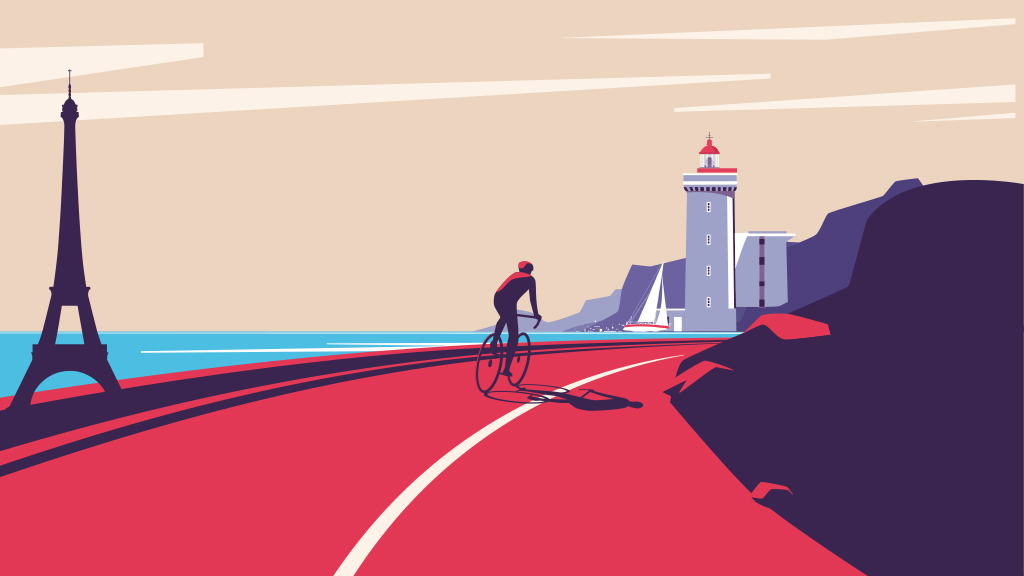Paris-Brest-Paris
Training
PBP requires seasoned Randonneurs. Indeed, it is a demanding target that might daunt a newcomer, however some basic rules of preparation should prove sufficient.
Phase 1: recovery
In France, PBP 2015 preparation starts by fall/winter 2014/2015! For an endurance athlete such as a Randonneur, the first requirement is the imperative need for complete recovery of mind and body following the (presumably intensive) summer season.
A period of rest allows you to avoid over-training that would ruin your PBP targets! But a ‘period of rest’ does not mean ‘hang up the bike’, even for a moment!
During this period, you must:
– Focus on low intensity exercise – winter rides will allow you to maintain base fitness, while riding with friends in a relaxed way
– Gather documentation about nutrition – very useful reading, which sometimes yields pleasant surprises: did you know, for example, that cocoa-rich chocolate (at least 70%), is supposed to protect our cardiovascular system and to deliver nutritional benefits for us, sports people?
Nevertheless enjoy it (chocolate, that is) in moderation…
– Related to the former point, watch your weight…Beware the holiday period…
– Think about the aches you felt during the summer season, or during your last PBP: aching tendons… back pains…muscle pains… aching knee… finger numbness… Do consult professional medical experts. Perhaps a study of your position on the bike will help eliminate any risk of disabling problems before PBP year
– Step up physical effort. Beef up back and spine muscles by appropriate exercise. Strong abdominal muscles will protect you from the back pain sometimes felt over longer distances!
Also keep track of your heart rate:
– Heart rate is an indicator of the rate of energy consumption. If you undergo a laboratory stress test, which we recommend, you will know the range of heart rate where you will need to stick to during your training.
– The heart rate monitor will then ‘check’ your heart rate during your training sessions and will be your management tool to ensure that these sessions are beneficial and pose no risk to your health.
Sous titre
Phase 2: basic endurance
The long distance Randonneur who wants to complete PBP in a good condition has to go through a period of preparation during which s/he carries out entirely aerobic work (without any oxygen debt), and during which the body first burns its fat surplus! Endurance, i.e. the physical and mental capacity of the Randonneur to resist tiredness, improves!
The first months of the year are often cold and uninviting. A kind of lethargy may descend on you. It keeps you away from the road. In this case, the solution is to have a short term target that gets you back on the road!
Why not a Fleche Velocio (Easter 2015) (or, Fleche-USA; or, Easter Arrow to York), to be ridden with friends, with no special ambition… It’s the right time to work together on basic endurance, and to improve your pedaling. Smooth pedaling movement is an aid for anyone wants to prepare for a major event. This smoothness comes over a long period of work after which you won’t pedal in void, but you will be able to turn a reasonable gear at 85/90 rpm for the circa 20mph average speed of a good Randonneur – on flat terrain, without wind –
Phase 3: the qualifying Brevets
No questions asked: these Brevets from 200km to 600km are qualifiers for PBP! Spread over a period of 4 months, they increase in difficulty. When ridden without any record in mind, preferably within a group at your current standard, these Brevets lead you towards optimum fitness, as long as you are able to observe around you the attitude and behaviour of your riding partners with most experience in endurance cycling, so you get maximum profit out of it.
Some will go as far as completing two series of four Brevets and adding a 1000km Brevet. With the Fleche Velocio and PBP, they will then be able to obtain for free the Randonneur 5000 award. But beware overdoing the long distances before you start Paris-Brest-Paris. Excessive tiredness, a drop in your fitness, or a sense of fatigue will indicate you have overtrained.
sous titre
Phase 4: the pre-PBP period
- Micro-rest
Once the qualifying Brevets have been successfully complete (as is our wish for you), it is not time to ‘fall asleep’. At most, a micro-rest of less than 7 days of complete rest will allow you to optimize recovery:
– Sleep: long nights of sleep… siest
– Nutrition: detoxify your body
- Intensity
We recommend you include in your training specific 90-120 minutes rides on which you work repetitively on power, or speed… The method is called ‘intervals’. There is one principle: before you repeat it, each short-duration effort must be imperatively followed by a period of active recovery, generally of the same duration, where you push small gears without any effort. These specific sessions (where your effort falls within the ‘intensive endurance’ range) allow you not to run on Diesel, which might be useful on PBP!
- Motivation
Do not lose motivation after this micro-rest! The target is very clear: PBP. But PBP is still far away. The basic work you have just gone through has put you in good shape. Maintain your aerobic training, but without recourse to long distances: you now have endurance, it is up to you to keep maintaining it!
- Hill training
Although some Randonneurs extend their series of Brevets with a 1000km, I personally prefer to fine-tune my preparation in moderately hilly terrain! Do select routes that you know well, and undertake short sessions as described in the former paragraph! Indulge yourself by entering Brevets Montagnards (hilly Brevets), without killing yourself, or enter the Semaine Federale (annual gathering of thousands and thousands of French cycle-tourists for leisurely riding).
Roger MARTIN
Audax Club Parisien
Finisher, 9 Randonneur Paris-Brest-Paris

